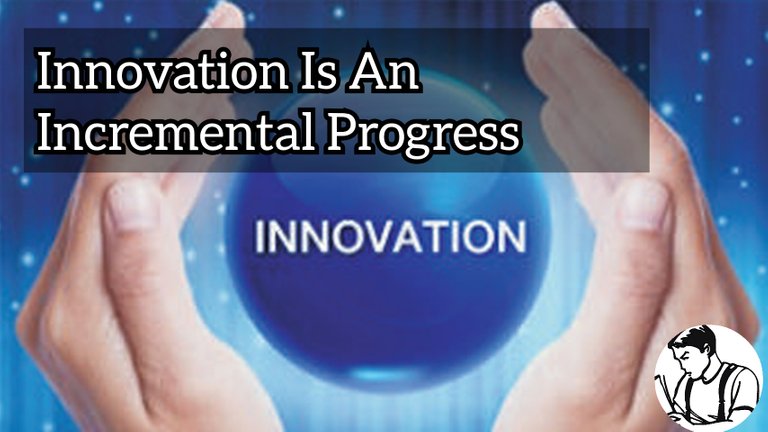Innovation Is An Incremental Progress

Innovation is one of the most overused words in business. We all want to innovate, but what does that actually mean? What do we mean when we say something like “we need to innovate our way out of this problem”? Many people think that innovation means inventing something new and innovative—a new technology or a revolutionary product design.
This is not always the case. When you look for examples of true innovation in history, you'll see that many innovations started as simple incremental improvements on existing products or services, which eventually led them down an entirely new path with tremendous impact on society as a whole.
Innovation doesn't always happen overnight or even over a few years: it can be an incremental process that takes place within a decade or more. You just have to be willing to fail every day so long as you're moving forward consistently and methodically towards your goal - no matter how small those steps are at first.
Continuous Progress In The Background
Remember that the true continuous progress is happening in the background. The long-term progress should matter more to you than the short-term disruption.The reason to innovate is not because of disruption. It's because of progress. That's what matters in the long term, not short-term disruption. You can't build a business on short-term disruptions, so don't be fooled into thinking that you're missing out if you don't get into the latest new thing right away.
Instead, focus on building something great and improving it over time until it becomes something that people want to use every day—and then take care of them with all your heart when they do use it every day!
People will always look for someone to blame. It's important to understand that this is an instinctive response, not just with innovation but with any kind of disruptive change.
As much as we want to believe in one-time events and as much as they appeal to our need for a good story, most change happens incrementally. It’s often not evident until it's been around a while and even then, it takes some time before we fully realize it.
Change Is Not Sudden But Incremental
It’s a lot easier to deal with change when it happens incrementally. We can see what is happening, and we can build our own resources to deal with it. If we are trying to build something new, however, this incremental progress can be challenging because we don't always know how much progress has been made or whether it's going in the right direction.As much as I want to tell you that change is usually an event and not a process, incremental progress is what drives technological innovation in the long run. Dont't take my word for it. Better yet, look at history.
The history of technological innovation is full of stories about disruptive innovations. The Model T, the Apple II, and the iPhone are all great examples of disruption. They were revolutionary in their time and they changed the world as we knew it. But they didn't happen overnight—they took time to develop and grow into something new and exciting.
It’s easy to get swept up in these big ideas, but there is another story behind them: incremental progress. This is how innovation works in the long run—not with big steps, but by taking small ones with each iteration until you have something to show for all your hard work (and I mean hard work).
Innovation Is Not An Event But A Process Of Incremental Progress
This is because it involves changing one’s mindset and behavior, which could take a long time. For example, if you want to lose weight (or build weight), you need to change your eating habits for quite some time before you start seeing substantial results. Similarly, if you want to improve your innovation skills or other skills in general, then it will require continuous effort over time rather than just a one-time event.Therefore, instead of focusing on the short-term disruption caused by innovation (e.g., how much money or time will be saved), you should focus more on its long-term impact (e.g., what kind of experiences and knowledge can I gain from this?)
When it comes to innovation, we should focus on the long term and not on the short-term disruptions. We need to embrace incremental progress as a way of life.
Thanks For Reading!
Profile: Young Kedar
Recent Posts;
● Lack Of Financial Knowledge And Its Consequences
● Is Money Really Becoming Worthless?
● Some Financial Philosophies That I Adhere To....
● Unlocking Innovation With Blockchain Technology
● The Risks And Benefits Of A Cashless Society
Dolphin Support: @cryptothesis
Posted Using LeoFinance Beta

https://twitter.com/695763267013181440/status/1601130239962533889
The rewards earned on this comment will go directly to the people( @ifarmgirl ) sharing the post on Twitter as long as they are registered with @poshtoken. Sign up at https://hiveposh.com.
Innovation takes time and just like you said, it goes through series of changes or incremental progress. At times it needs a lot of tweaking and such, therefore it shouldn't be rushed.
Posted Using LeoFinance Beta
Right. It's a work in progress until the explosion happens, then things pick up speed but the essence is always in the daily, weekly or monthly incremental progress.
Yes, very true. The progress might even be insignificant at some point :)
Posted Using LeoFinance Beta